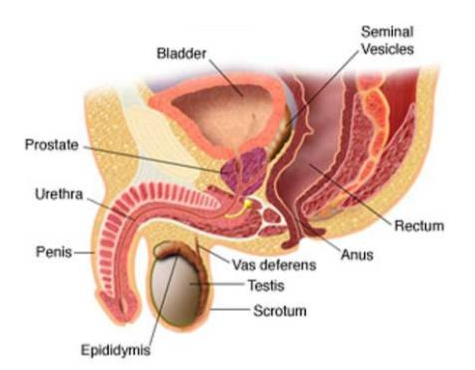Prostate cancer is a cancer that starts in the prostate gland, when the abnormal cells begin to divide in an uncontrolled way, eventually forming a lump.
The prostate gland is part of the male reproductive system. It is a small gland located just below the bladder and in front of the rectum (back passage). The main function of prostate is to produce fluids to liquify semen as well as supporting the bladder.

Prostate cancer does not usually cause any symptoms in the early stages. Most men report urinary symptoms as they get older. This often is not directly related to prostate cancer; it is usually caused by the benign enlargement of the prostate. When prostate is enlarged, it puts pressure on the urethra; the tube that carries urine from the bladder out of the penis.
Common symptoms of prostate enlargement include:
- needing to pee more frequently, especially at night
- needing to rush to the toilet
- difficulty in starting to pee
- straining or taking a long time while peeing
- weak flow
- blood in urine or in semen
The symptoms of prostate cancer usually happen when the cancer has spread beyond the prostate, into the advanced stage.
Common symptoms of prostate cancer include:
- pain in the bones
- weight loss
- loss of appetite
There are different types of prostate cancer:
- early (localised) prostate cancer – when the cancer is only inside the prostate gland
- locally-advanced prostate cancer – when the cancer has spread through the capsule surrounding the prostate gland and may have started to spread into tissue or organs close by
- advanced (metastatic) prostate cancer – when the cancer has spread to other parts of the body, such as the bones
Treatment for prostate cancer at CUH
The treatment you have depends on several factors, which include:
- the stage of the cancer
- the grade of the cancer (grade group or Gleason score)
- the risk group of the cancer
- your age
- your general health
A team of specialists at CUH will meet to discuss your condition and to make a recommendation about the best possible treatment or management for you.
You, along with your clinician, will then discuss the recommendations at the clinic appointment and decide on the right treatment or management plan for you. Your clinician will explain the different treatment options and possible side effects.
For many people with prostate cancer, no treatment will be necessary.
The treatment for prostate cancer can include:
- active surveillance
- robotic assisted radical prostatectomy
- radical radiotherapy with hormone
- stereotactic body radiotherapy
- brachytherapy
- watchful waiting
- androgen deprivation therapy in hormone treatment
- chemotherapy
Patients with prostate cancer can also be offered the focal therapy treatment, which is an approach that targets and destroys only the cancerous tissue within the prostate gland, leaving surrounding healthy tissue intact. CUH however, does not currently provide focal therapy services. Patients wishing to explore this treatment option are referred to one of the specialist centres located in London.
Read more about the different types of treatment on our website.

